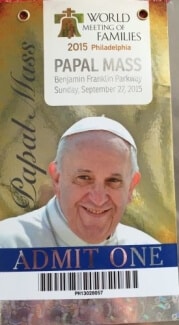
Pope Francis likes to remind leaders that people do not listen to teachers; they listen to witnesses. And they listen to teachers only if they are also witnesses. We have many teachers in the Church today, but what about witnesses?
Today’s story from the Book of Maccabees tells us about one of the Bible’s great witnesses. He was an honored scribe who spent his life writing holy words. His words, however, are lost in history, but his witness is still very much alive—even over two thousand years later. A ninety-year old man who had little left to give in life, made such a profound statement that God honored him by placing his story in His inspired Scriptures (2 Maccabees 6:18-31).
“Eleazar, one of the foremost scribes, a man of advanced age and noble appearance, was being forced to open his mouth to eat pork. But preferring a glorious death to a life of defilement, he spat out the meat, and went forward of his own accord to the instrument of torture, as people ought to do who have the courage to reject the food which it is unlawful to taste, even for the love of life.”
Some of his “buddies” who cooperated in this unlawful ritual could not bear to see this old, dignified man be tortured. So they pulled him aside and proposed a plan. They would slip him a piece of kosher meat, and he would eat it with the pretense that it was pork. This would please the torturers and also keep him within the bounds of the Jewish law. Eleazar, then, would be spared death and go on to live a full and honorable life as a noted scribe. This holy man refused to compromise, however, because he realized the bad example it would give to young people.
“Eleazar made up his mind in a noble manner, worthy of his years, the dignity of advanced age, the merited distinction of his gray hair, and of the admirable life he had lived from childhood, and so he declared that above all he would be loyal to the holy laws given by God.”
He explained:
“At our age it would be unbecoming to make such a pretense; many young people would think the ninety-year-old Eleazar had gone over to an alien religion. Should I thus pretend for the sake of brief moment of life, they would be led astray by me, while I would bring shame and dishonor to my old age…Therefore, by manfully giving up my life now, I will prove myself worthy of my old age, and I will leave to the young, a noble of example of how to die willingly and generously for the revered and holy laws.”
We wonder what a ninety-old-man can contribute to life. Isn’t it time for him to be sent “out to pasture,” and sit in a soft chair uttering wise sayings? Eleazar proves to us that our last day on earth has the potential of being our greatest. He went down with a shout that still reverberates in the hearts of believers throughout history. His final earthly “sermon” was to give a noble example to the young, showing them that dying for God is more satisfying than hanging on to this “brief life” for a few more years.
As his body surrendered to torture, Eleazar cried out a final testimony and declared that even though he was in “terrible pain” he was “suffering it with joy.” At that moment he realized his life had a final purpose.
“This is how he died, leaving in his death a model of courage and an unforgettable example of virtue not only for the young but for the whole nation.”
Wow! After reading about the courage of this ninety-year-old man who lived a faithful life even from childhood, none of us dares present excuses for living a mediocre life or contaminating our personal witness with tactics of self-preservation. The final play of our “game” of life will be our most important one. Our greatest witness is yet to come.
Young people today hunger for noble examples. They need more than the example of a good lives on earth; they need to see heroism even in death. They are exposed to hundreds of teachers; how many witnesses do they encounter? They hear about courage; where do they see it?
“I fear not the myriads of people arrayed against me on every side” (Ps 3:7).
